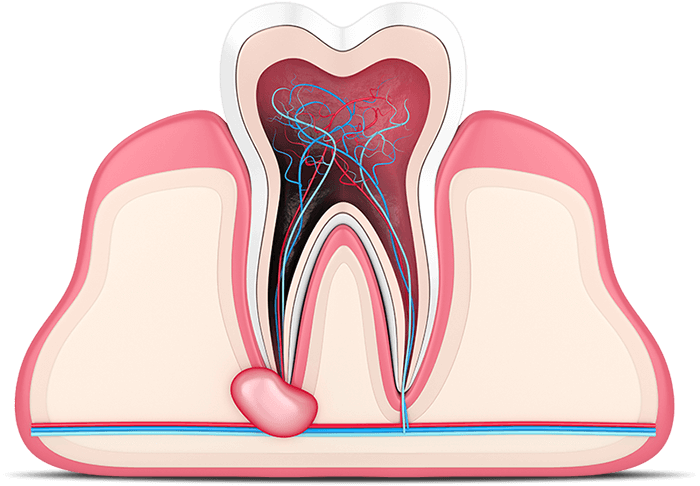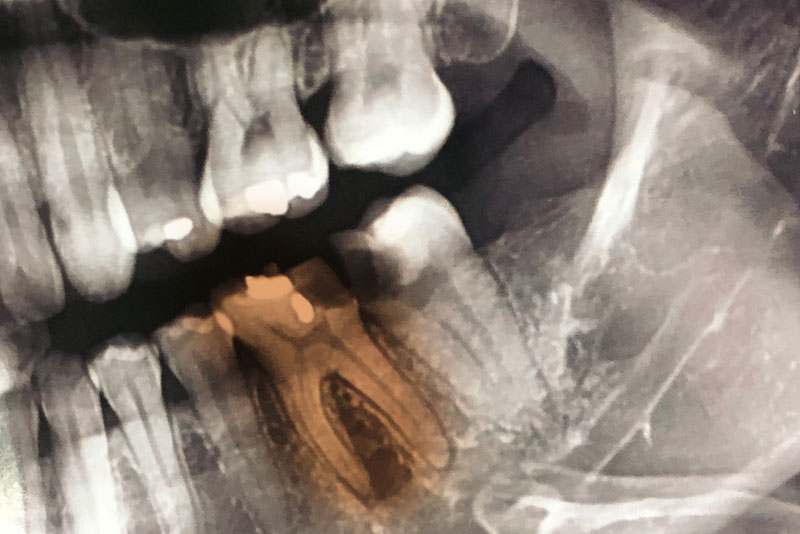
About 15 million teeth are saved every year with root canal treatment. A root canal is necessary when the pulp of a tooth becomes inflamed or infected. If pulp infection is left untreated, this can cause severe pain and/or lead to an abscess. While the perception that root canals are painful began decades ago, advances in dental technology have resulted in root canals that are no more uncomfortable than having a cavity filled. At South County Complete Dental Care, we strive to change what patients think about root canal treatment by using technologies that enable a painless approach while also alleviating dental anxiety. During a root canal in our St Louis, MO office, our highly skilled oral surgeon removes the infected pulp and nerve in your tooth root, cleans and shapes the inside of the root canal, then fills and seals the space.

To understand what happens during a root canal in St Louis, MO, it helps to have basic knowledge of the impacted oral anatomy. The pathway that runs straight down through the root of your tooth that consists of the nerve and blood vessels is known as the root canal. The root canal system includes the pulp chamber and root canal space. In normal teeth, the pulp chamber is located inside the anatomic crown (tooth) beneath the white outer enamel and dentin. The roots are covered in a substance called cementum that helps attach teeth to the surrounding alveolar bone (the bone that supports your teeth) via the periodontal ligament. When the pulp chamber is normal, it resembles the shape of the crown surface. Pulp is the softest layer of the tooth and contains blood vessels, nerves and connective tissue essential to the production of dentin as the tooth develops. Dentin is the second layer, and is made of calcified, living tissue that continues growing throughout the life of a tooth.

A tooth root comprises the lower two-thirds of your tooth and serves to anchor it in position and keep your jawbone healthy. The root canal space is located below the pulp chamber in what is called the radicular portion of the tooth. The end tip of the tooth root is called the apex. Root canals can be round, oval, long oval, flattened or irregular. In most people, incisors, canines and premolars have one root, while molars have two or three, each of which can get infected. Due to the complex branching of nerves, most teeth have an intricate internal anatomy. Oral surgeons are the right choice to handle your root canal treatment because they have specialized advanced training.


Causes of inflammation or infection in dental pulp include deep decay due to untreated cavities, repeated dental restorations or cracked/chipped teeth. Tooth trauma can result in pulp damage without visible chips or cracks to the enamel. Trauma can also cause nerves and blood vessels to deaden when blood fails to properly flow to these areas. Bacteria from an infection can be carried by the blood vessels deep inside your tooth root. The clinical term for inflammation of the dental pulp is pulpitis. While the principal symptom is pain, diagnosis is based on clinical findings, as well as digital X-rays and pulp vitality tests. Treatment involves removing decay, restoring the damaged tooth, root canal therapy or tooth extraction.

During a root canal in St Louis, MO, our oral surgeon first numb the treatment site with a local anesthetic.
When pulp inside your tooth root becomes infected, the pulp and bacteria must be removed to save your tooth, oral health and overall health. During a root canal in St Louis, MO, our oral surgeon first numb the treatment site with a local anesthetic. If you suffer from dental anxiety or need additional sedation, we offer diverse sedation options. Either way, you won’t feel any pain, although you may experience slight pressure as we complete the procedure. We drill a small hole in your tooth crown to gain access to the pulp chamber and carefully clean out all the bacteria and infected pulp and tissues. Then we fill and seal the end with a rubberlike material called gutta-percha. Afterward, the tooth is restored with a crown or filling to protect it and restore normal function. We accept many insurance plans and offer third-party financing to ensure your treatment is both painless and affordable.

At South County Complete Dental Care, we believe in using innovative endodontics in St Louis, MO to benefit our patients, such as micro-endoscopy and the GentleWaveâ Procedure. In fact, we’re one of only two practices in NYC to use groundbreaking GentleWave technology, which requires specific training and certification. Special operating microscopes enable our oral surgeon to see tiny details inside a tooth that guide more accurate treatment.
The GentleWave Procedure is a minimally invasive state-of-the-art protocol to access the infected root canal system. The protocol enables the preservation of more of the natural tooth, thereby helping the tooth structure remain strong. Using GentleWave, our oral surgeon can typically clean and fill the tooth in just one visit, compared to the several appointments required with standard root canal therapy. Thorough debridement of the tooth is essential when performing root canal treatment to prevent the need for root canal retreatment or an apicoectomy. In our experience, GentleWave provides the most predictable method for thoroughly cleaning and disinfecting complex internal anatomies.
At South County Complete Dental Care, we believe in using innovative endodontics in St Louis, MO to benefit our patients, such as micro-endoscopy and the GentleWaveâ Procedure. In fact, we’re one of only two practices in NYC to use groundbreaking GentleWave technology, which requires specific training and certification. Special operating microscopes enable our oral surgeon to see tiny details inside a tooth that guide more accurate treatment.
The GentleWave Procedure is a minimally invasive state-of-the-art protocol to access the infected root canal system. The protocol enables the preservation of more of the natural tooth, thereby helping the tooth structure remain strong. Using GentleWave, our oral surgeon can typically clean and fill the tooth in just one visit, compared to the several appointments required with standard root canal therapy. Thorough debridement of the tooth is essential when performing root canal treatment to prevent the need for root canal retreatment or an apicoectomy. In our experience, GentleWave provides the most predictable method for thoroughly cleaning and disinfecting complex internal anatomies.
When our oral surgeon perform a root canal in St Louis, MO, this will enable you to live a comfortable and functional life free of tooth pain. The benefits of root canal treatment include:
The best way to prevent a root canal is to practice good oral hygiene, avoid hard food that can crack teeth, and protect your teeth when playing sports. Follow these additional precautions:

Infected tooth pulp will not heal on its own, and will only get worse. Although the pain may disappear and you may think the infection has healed, this is actually a signal that the nerves inside your tooth have died. Although the pain subsided, the infection is still present inside your tooth, and the only treatment option other than a root canal is tooth extraction. If you forgo either treatment, a bacterial infection can spread to your jaw, brain, blood, and possibly the rest of your body. The consequences can be serious, and even fatal!
I understand the information disclosed in this form may be subject to re-disclosure and may no longer be protected by HIPAA privacy regulations and the HITECH Act.
